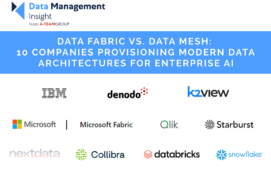
The peculiar demands that ESG data integration places on capital markets participants requires powerful techniques that are increasingly being provided through artificial intelligence, A-Team Group’s recent ESG Data and Tech Briefing London heard.
From data quality monitoring and analytics to supply chain analysis and investment management, AI-based tools are already offering automated solutions to some of the toughest requirements in ESG data management.
In a panel discussion that brought together leading exponents in the deployment of AI applications to solve sustainable finance challenges, delegates heard that the need for such products was on the rise.
While it may appear that sustainability as a concept within the financial services sector has been abandoned in the wake of the dismantling of US ESG regulations and mandates, the panel said that environmental and social considerations had become an integral part of the risk and investment management processes of firms.Most Used
The panellists – which comprised Navin Rauniar, Non-Executive Director at PRIMIA UK; Nirav Shah, Senior Executive Director, Quant and ESG Technology at JP Morgan Asset Management; Anna-Marie Tomm, Senior Data Scientist (ESG) at Man Group; David McNeil, Vice President, Climate Research and Strategy at PGIM; and,
Sam Barber, Head of EDM Product at Rimes – agreed that the chief data challenge presented by ESG was the integration of unstructured data.
ESG data’s links to specific investment and risk requirements are not always obvious, and mapping it to specific use cases is so complex that only AI technology can execute such workflows quickly. For this reason, the use to which AI is being most commonly applied is to the automation of data collection and processing, the panel heard. With AI still in its infancy from a capital markets point of view, deploying AI to routine reporting, data collection and data cleansing provides as low-risk and easily accessible application of the technology but one that brings “quick wins” in terms of value accretion.It was observed, though, that this picture of simplistic deployment would likely change in the next year as more tools become available, particularly through the use of agentic AI. As the technology matures, the risks of using it would wane too, making adoption more widespread.
Future Opportunity
With greater trust in the technology a world of analytical opportunity will open with a wide range of use cases already being piloted or used discussed by the panel:
- Integration in the investment process, especially covering private markets, in which the data record is thing and patchy.
- The interrogation of granular ESG data, a process that’s already in train and making ESG scores almost redundant.
- Data-quality monitoring tools. These are already in use, deployed alongside established monitoring systems managed by engineers.
- Supply-chain analysis, because calculating the carbon intensity and footprints of the multiple layers of vendors, logistics carriers and service providers within any chain requires high-performance computation.
- Productivity improvements. One panellists explained how their company was using AI to help in the assessment of requests for proposals, a process that typically touches on multiple business units within any business.
The opportunities that AI offers ESG and sustainability managers must be considered alongside the challenges the technology poses. The panel stressed that strong governance was essential to ensure the data was being ethically used, and the risk of baking biases into the models required careful pre-deployment analysis.
Cautionary Tale
With ESG data moving from a “best efforts or a voluntary disclosure regime to increasingly regulated assurance based regimes” getting the data piece right has never been more crucial, the panel noted too. This must be taken into account because disclosures will have to be explainable and that would be difficult with material erroneously generated by AI.
The webinar ended on another cautionary note. The surge in use of AI across industries and individual users had placed pressure on data centres, which are now using 150 per cent more energy – at a cost to the environment – and whose capacity is growing at a slower rate than demand. That will inevitably lead to restrictions on data centre usage, something that must be factored into institutions’ future AI development plans, the panel heard.
Subscribe to our newsletter




